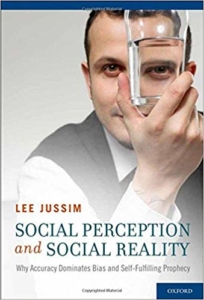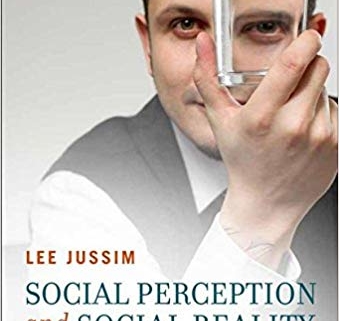Prof. Lee Jussim’s “Social Perception and Social Reality” and the Leftist Bias of Social Psychology

It’s well known that social psychologists are overwhelmingly liberal in their politics—exactly three people in a crowd of 1000 at a psychology conference raised their hand when Jonathan Haidt asked how many identified as politically conservative. In fact, social psychology is a good example of Haidt’s concept of “tribal moral communities” that infest our political discourse on race, multiculturalism, gender, etc. People within the (liberal) tribe believe themselves morally (and intellectually) superior to people who don’t think the way they do. And we know that liberal social psychologists are perfectly willing to discriminate on the basis of their political attitudes in hiring decisions, etc.
It is also well known that there is a replication crisis in social psychology. Prof. Lee Jussim’s Social Perception and Social Reality: Why Accuracy Dominates Bias and Self-Fulfilling Prophecy (Oxford University Press, 2014) describes several examples of non-replicable findings which have become hugely influential in the field. My favorite is the study claiming to show 100+ point improvements in IQ scores as the result of expectancy effects, placing these individuals in the top 99.9999999987th percentile. How long can it be before everyone has an IQ of 200 just by having someone in authority tell teachers that their students are “late bloomers”?
Here I have compiled some particularly striking passages (please read the whole thing) from a masterful review by Thomas Jackson at AmRen. It is essential reading for anyone interested how the leftist politics of academic social psychologists have corrupted understanding of group differences.
[Jussim’s book] is an extensive and painstaking refutation of a set of mistaken assumptions that have dominated social science research since the 1950s and continue to bias the thinking of most professionals in the field. It is a book for specialists—exhaustive and meticulously documented—but it systematically dismantles the illusions that helped give rise to today’s reflexive suspicion of Whites. …
The construction of group differences begins with false, negative views people are supposed to have about certain groups. In every instance, the unspoken assumption is that these deluded “people” are white. They are the dominant majority, and use stereotypes to hold everyone else down. …
What these studies–phony or not–were supposed to prove was that stereotypes are so powerful that people cling to them no matter what. In fact, as Prof. Jussim notes, research findings are clear: people use stereotype when they have no other information to go on, but as they get more “individuating” information they treat people as individuals. Prof. Jussim notes that this is still a controversial conclusion among social scientists, who are convinced that most people are blinded by stereotypes and ignore information about individuals. …
The following is a great example of how this research results from membership in a tribal moral community that believes that not thinking like they do is evil. “Believing in negative stereotypes is nothing less than bigotry.”
At an even more basic level, social scientists widely believe that stereotypes are, virtually by definition, wrong. They believe stereotypes rationalize discrimination, so, as Prof. Jussim notes, “crediting any accuracy to stereotypes is tantamount to endorsing bigotry.” He points out that there used to be plenty of research into the accuracy not only of stereotypes but of what people thought about themselves and other people. This research stopped dead from about 1955 to 1985. The assumption that all stereotypes are wrong was so widespread that it was considered futile–even immoral–to study their accuracy. …
Prof. Jussim finds that liberals are especially likely to disbelieve in group differences:
[T]hose most likely to inaccurately underestimate real differences were liberals in denial about group differences. . . [I]ntelligence did not matter for this group. Brainy liberals were just as likely as dumb liberals to inaccurately minimize real differences.
It’s the opposite for non-liberals. The smarter they are, the more likely they are to have an accurate understanding of group differences. …’
Of course, as Prof. Jussim points out, the very people who claim to hate stereotypes actually love them—in the right context. He notes:
As long as we are demonstrating how open-minded, tolerant, sensitive, and caring we are, it is permissible, even good for us to ‘understand group differences.’ So, in contrast to a social-problems context, where believing in group differences constitutes lowdown dirty stereotyping, in a (multi-)cultural context, recognizing and being ‘sensitive’ to group differences shows how benevolent and egalitarian we are. …
Although [Jussim] does not say this, opposition to the idea of stereotypes is rooted in the refusal to admit even the possibility of any group difference except for The One and Only True Group Difference, namely, that white heterosexual men are evil. Blacks are really as good at math as Asians, and women would make cracker-jack Green Berets, but white men keep them all cruelly oppressed. …
As Prof. Jussim points out, the very idea of self-fulfilling prophecies (SFP) is remarkable—people (White men, anyway) can create reality merely by believing something. Prof. Jussim notes that this idea has extended into all sorts of improbable areas: If enough people are told that introverted Sally is actually extroverted, they won’t change their beliefs when they meet her; instead, the power of SFP will turn Sally into an extrovert! …
SFP is supposed to be at its most powerful in schools. Prof. Jussim notes that it is common for liberals to believe that “[social]-class-based teacher expectations help create a ‘cast-like’ system that benefits middle-class children and undermines children from lower social class backgrounds.” …
All told, unlike the traditional, grim view of (White) people forcing out-groups into oppressive little boxes through the power of stereotype and SFP, people make reasonable generalizations from experience but set them aside when they meet an exception. …
[W]hat Prof. Jussim does not say is that the “clear villain” who turns up in these studies is always and inevitably White people. The conceptions he is dismantling are not just wrong: They are an important part of the conviction that White men are a scourge and that the world would be much better off without us. That is what makes this book so important.






Comments are closed.